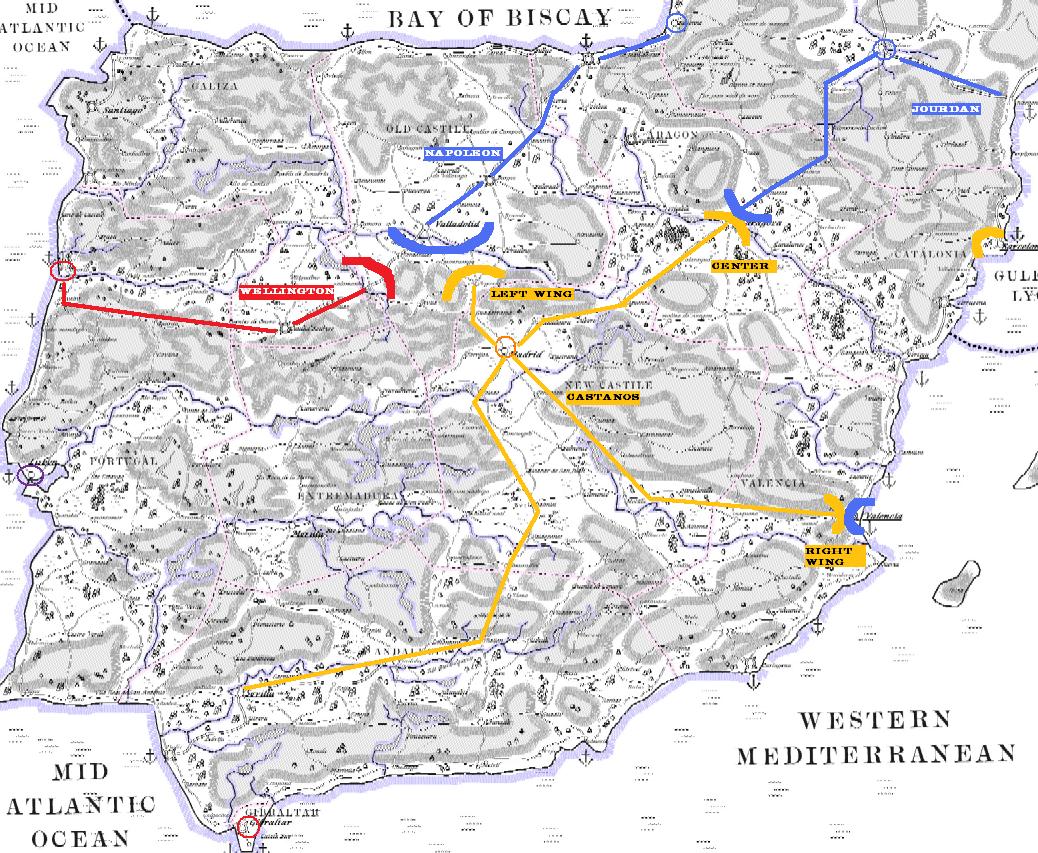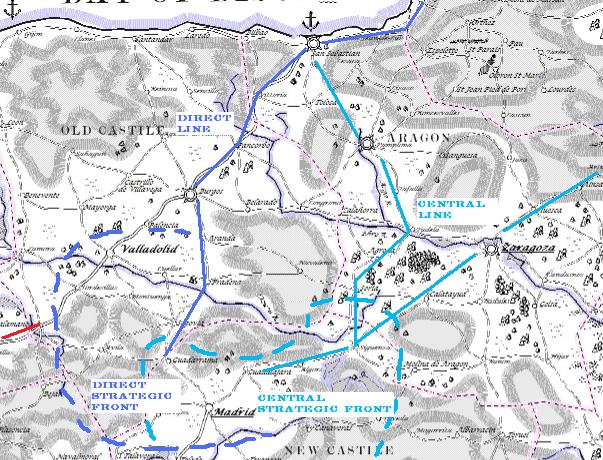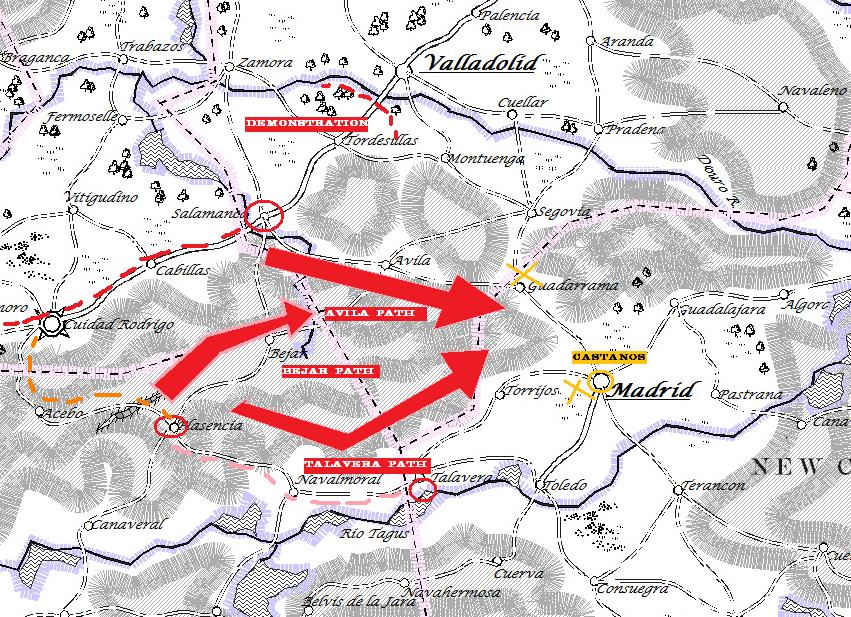Essay on the Strategy for defense of
Madrid
Not thinking in terms of day-to-day or reaction, but bigger picture stuff.
I'm been mulling over some Sun Tzu, Jomini, and Napoleon's Maxims.

Sun Tzu reminds us that victory is found in forcing our enemy to fight when and
where we want him to, when he is confused and spread out and defeat is found
when we fight on our opponent's terms. Currently, we have entirely surrendered
the initiative to Bonaparte. We can tell this because all of our planning goes
something like this: 'If Napoleon does X..."
Instead, we should strive to offer him a deal that he cannot refuse. We must
dictate the play. Yes, it feels like we are having to sit back and lick our
wounds but we are allowing him to do the same thing and while he does that, he
is also still on the attack and still forcing the conflict to unfold in the
manner of his choosing.
We suffer from having two different lines of communications, something that
Jomini says should always be avoided unless the politics of coalition demand it.
In effect, in this position we have given Bonaparte the central position. He
operates on a single line and can fight on two fronts, shifting forces from one
side to the other as needed.
At least we do have convergent lines but note, our lines are convergent in the
attack and divergent in defeat. If we do not find ways to attack then we are
obliged to get further apart and therefore weaker.
Thankfully, my bold aggression against Jourdan seems to have entirely reaped a
benefit. After I took Barcelona that General has recoiled to rethink his
strategy it seems. Barcelona is near to undefended and would have fallen by now
if he had attacked it with anything. Since loss of Catalonia has severed his
lines of communications to Valencia, I expect that he has opted to rebuild his
line by sea instead. In any case, we are thankfully without the distraction of
Jourdan for the time being.
Jomini and Sun Tzu both tell us that it is folly to attack the enemy where he is
most prepared and that is generally head on. We are not so strong that we can
afford to simply advance to seek battle with faith in triumph. As Sun Tzu says,
we must win before the battle is joined.
In order to accomplish this, we must strive to split Bonaparte's forces in such
a way that he cannot shift troops from one flank to the other. We must turn his
central position into one that is composed, be necessity, of distinct strategic
fronts.
Currently, Napoleon's strategic front allows him to cover his base of
operations, his line of operations, and his strategic objective (Madrid) with
the same force. As he approaches Madrid, this becomes more problematic for
him... unless Zaragoza falls.
A strategic front, as described by Jomini, is the area to the front of an
operational line of communication that is within 3 days march.

Bonaparte is currently, I believe, operating on the direct line. Should Zaragoza
fall, the two armies of the French will likely then shift their lines to run
through a more central route. This will be problematic for us. Indeed, Bonaparte
could already reliably shift to that line but I don't think he will have. I
think that he too is focussed on the highway. Note that the central line has a
blind spot north of Madrid.
The problem is that currently, as Napoleon moves for Madrid, his line of
communications remains within his strategic front until near to Burgos and with
a garrison at Burgos, that is not a good place to try to force a battle.
The British, as presently configured, cannot get around Napoleon's strategic
front without exposing their own line of operations to attack. The further the
British move from this line, the more they become weakened by the necessity of
protecting it.
If we are going to hope to get around Bonaparte's flank prior to the fall of
Madrid, the British will need to drastically alter their line of operation until
it is perhaps up along the northern coast. That is fairly impractical and worse,
it puts the Spanish and British on even more divergent lines. We become entirely
separated. No, it seems that a wide arc against Napoleon's right flank seems
impractical and prone to disaster.
I look for ways to draw Napoleon east, forcing his strategic front to turn away
from the British but that blind spot north of Madrid is entirely problematic.
Our saving grace might come if Napoleon makes the mistake of putting too much
stock in protecting Valladolid. If the preservation of Valladolid becomes one of
his strategic objectives, then his force will need to be split between that and
taking Madrid.
We can do one thing to encourage that mistake: Hamilton can demonstrate against
Valladolid, putting out piquets to there etc. Make him believe that it is one of
our objectives and it will raise in his estimation.
It would be a mistake though if we seriously looked at Valladolid as an
objective at this time. No, allow the French to be diluted in defending it and
we must concentrate in defeating him before Madrid. Everything changes once
Zaragoza falls.
Until then, I suggest that the British demonstrate toward Valladolid and mass
toward Madrid.
If the British are going to march on Madrid (after/while demonstrating at
Valladolid) then there are three possible approaches:
1> The Avila option - with this option the Center of Operations for Wellington
is at Salamanca. The Spanish and British seek to meet a diluted Napoleon at
Guadarrama.
2> The Bejar option has the British Center of Ops at Plasencia and again, we
meet the French at Guadarrama.
3> The Talavera option has the British center of ops at Navalmoral and has us
meeting the French at Madrid.

The pros and cons of each option...
The Avila Plan:
It has the advantage that it requires no infrastructure change for the British
and could be implemented very quickly, within days even. It seems, at first
glance, to be the most attractive option for those reasons alone.
The disadvantages though are serious. If the French were to see through the
demonstration before valladolid and attack, they could be at Salamanca almost
instantly and suddenly, in an effort to secure the British line, Wellington
would be obliged to divert troops to oppose this. In other words, this option
exposes the British line when they turn toward Madrid.
Secondly, should the attack at Guadaramma fail or we are required by
circumstances to cancel the scheme (should Zaragoza fall, for example), then the
British are again on a divergent line with the Spanish and we are left
separated.
Finally, meeting the French at Guadarrama is less than ideal because it is still
close enough to Valladolid that the two are almost within supporting range of
one another. At Guadarrama, for example, Napoleon would still have his
Valladolid forces within a day's ride by courier. If the objective of this
enterprise is to split the French forces then we should do better to force them
further apart.
The Hejar Plan:
The advantage to this over the Avila plan is that the line of operations is more
secure. A French advance from Valladolid is no threat.
It could be implemented fairly quickly by moving the bulk of the British force
to Bejar and Avila via Salamanca and only moving the line of communications at
the last minute. The troops don't have to go that long way around. Still, as it
is an infastructure change, it would require some disruption and slow down of
the arrival of reinforcements and replacements.
It has another advantage in that should the British be required to fall back on
Hasencia, they are not so cut off from Madrid. it is less divergent since they
could then switch quite easily to the Talavera road.
This has the same disadvantage with attacking at Guadarrama in that it is still
too close to Valladolid for my liking.
The Talavera Option:
This has the advantage of putting the British line of communications much less
divergent than the others. And reverses still put the British in a good, central
position.
The first glaring disadvantage is the time delay. This would set us back by a
week and I am suspicious that we have that much time before Napoleon is at
Madrid. If I am victorious at Segovia then we may very well get the time we need
for this.
Another disadvantage is that, though Madrid is a great place to fight because it
is well distant from Valladolid, it means that we have no margin for error. Not
quite true. We might be thinking about an attack to retake Madrid at this point.
Another disadvantage is that it potentially exposes the flank of the British
line of communications at Cuidad Rodrigo. This being a fortress though, it would
be easily defended and it is as good a hinge as you could want. If the French
are attacking there then they are not attacking someplace less well defended.
More alarming though, and related, is that the routes north from the Talavera
line are severely restricted. If the British were to adopt this line, their
strategic front is forced to be toward Madrid. With the other lines, there is
more flexibility for shifting direction.


